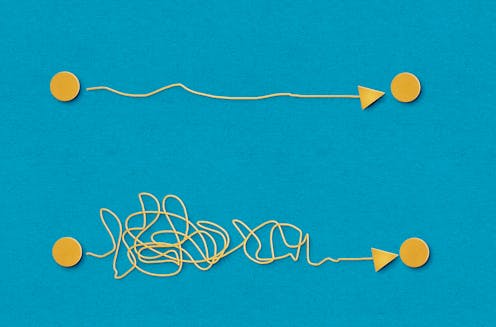Readers prefer to click on a clear, simple headline − like this one
Typical news readers prefer news headlines with simple language over more complex wording.

In an era when people trust news less than ever, how can journalists break through and attract the attention of average people to provide information about their communities, the nation and the world?
By not complicating things.
Our research, published in Science Advances, shows that simple headlines significantly increase article engagement and clicks compared with headlines that use complex language.
In our research, typical news readers preferred simple headlines over complex ones. But importantly, we found that those who actually write headlines – journalists themselves – did not.
We first used data from The Washington Post and Upworthy to see how language features, such as word length and how common a word is, changed how many people clicked on an article’s headline. These datasets included over 31,000 randomized experiments – also known as A/B tests – that compared two or more headline versions of the same underlying article to determine which one generated the most clicks.
Headlines with more common words – simple words like “job” instead of “occupation” – shorter headlines, and those communicated in a narrative style, with more pronouns compared with prepositions, received more clicks. For example, The Washington Post headline, “Meghan and Harry are talking to Oprah. Here’s why they shouldn’t say too much” outperformed the alternative headline, “Are Meghan and Harry spilling royal tea to Oprah? Don’t bet on it.” This example illustrates how sometimes a more straightforward headline can generate more interest.
In follow-up laboratory experiments, we found that typical news readers focused more on simple rather than complex headlines because the writing was easier to understand. When journalists participated in the same experiments, they didn’t show any preference for simple headlines over complex ones. Put differently: Those who write the news appear to be less responsive to simple writing than regular audiences.
Generations of communication consultants have advised that communicators follow the rather crass acronym KISS: Keep it Simple, Stupid. We suggest a modified version applied for journalists. Since KISJ isn’t all that simple, we propose: Keep It Simple, Staffers. Simplicity increases the number of people who click on a news story headline and improves reader recall of the material in the article. Most importantly, simplicity boosts reader engagement, such as how much attention they pay to the information.
Why it matters
News outlets that appear ahead of the curve have already implemented KISS strategies. For example, Ezra Klein, a journalist who founded the explanation-focused news site Vox, recommends journalists avoid writing for their editors.
As our work finds, writers and editors respond differently to complexity than people who consume the news. Therefore, one way for journalists to avoid the writing-for-editors problem is to simplify the writing with readers in mind: Use shorter words, write shorter sentences, and use more everyday words instead of complex alternatives. Work that is more approachable will reach the widest audience and garner the most engagement.
Writing simply could have additional effects beyond engagement, too. Information has never been more abundant, and yet readers are consistently in search of credible news providers. One potential pathway to improve how people think and feel about news is through simplicity. Since simple writing has been linked to increased perceptions of trust and warmth over complex writing, news providers may want to think deeply about word choice when creating their next article or broadcast.
Simplicity in headline writing matters both because the news market is extremely competitive and because it reduces a barrier between the public and important information. Our research does not suggest traditional news sites should become “clickbait.” Rather, it suggests that if headlines become more accessible to average news readers, they will be more effective for engagement and, hopefully, a more informed public.
The authors do not work for, consult, own shares in or receive funding from any company or organization that would benefit from this article, and have disclosed no relevant affiliations beyond their academic appointment.
Read These Next
Abortion laws show that public policy doesn’t always line up with public opinion
Polls indicate majority support for abortion rights in most states, but laws differ greatly between…
The cost of casting animals as heroes and villains in conservation science
New research shows how these storytelling choices can distort science – and how to move beyond them.
Detroit was once home to 18 Black-led hospitals – here’s how to understand their rise and fall
In the early 20th century, Detroit’s Black medical professionals created a network of health care…





